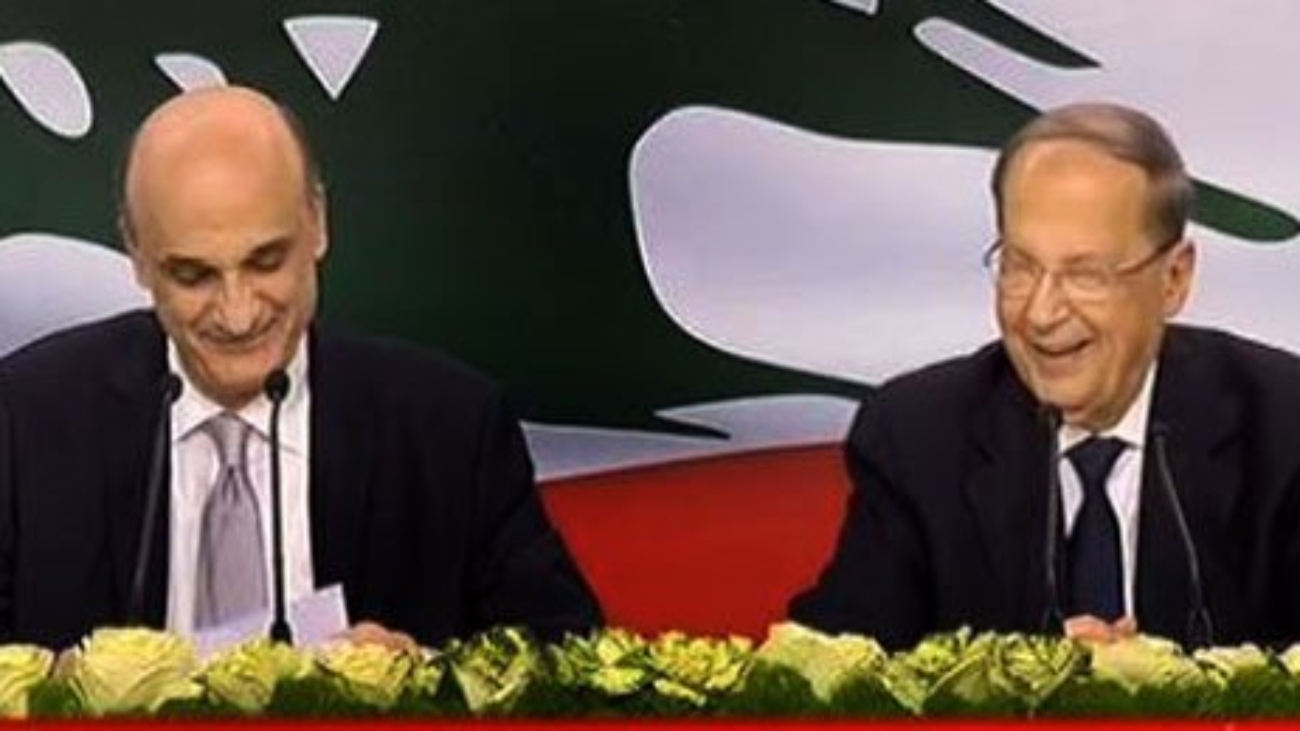English follows Arabic (On the Geagea-Aoun agreement)
A friend asked me why I did not comment on the recent “reconciliation” between Aoun and Geagea. My answer was that there is no “reconciliation”.
1- What happened is very important because it changes the Christian political landscape in Lebanon from one of perpetual hostility between two major Christian parties (who nonetheless cannot claim an exclusive representation of Christians) to one of normal political practice whereby both parties collaborate sometimes and resort to competition in other circumstances. It also reflects that every party acknowledges the existence and constituency of the other party. It also takes us away from the usual “I am the only representative of the Christians in Lebanon”. The move also protects the Christians from the ongoing calls to “unify the Christians”, a poisonous slogan inherited from the era of Syrian tutorship and some fiction leftists.
2- Describing the Aoun-Geagea initiative as a “reconciliation” is misleading. First, the interaction – both political and personal- between both Aoun and Geagea has always existed and culminated last year by the “Statement of Intents” adopted by both parties. On the personal level, General Aoun paid a visit to Dr. Geagea in his detention center as soon as the former returned from Paris in 2005. Both described the discussion as highly “humanistic”. Geagea paid condolences visits to Aoun couple of times as well in the last few years. So what happened is not new
3- What happened is just a temporary political alignment on a specific issue and comes as a reaction to another imitative (Hariri-Frangieh). And this is actually the main weakness of this rapprochement in the sense that it came – in its form and timing- as a reaction rather than a strategic shift with regards to the vacuum in the Presidency of the Republic. This actually might be the major reason of its collapse later one
4- I came across a lot of criticism of the recent move. Two of them caught my attention: the political criticism and the one that criticized the absence of attention to the victims of the violent conlict that involved both Aoun and Geagea in 1990.
5- Most of the “political” criticism reflects a unfortunate and steady rejection for the rights of the Christians to align behind a specific political agenda.
6- The 2nd criticism is very important but there are important questions around the timing. So going through a “truth and reconciliation” process should be an uninterrupted demand for the Christians and non-Christians since 2005. It should not be a “convenience” demand depending on political alignments. Most of the ones criticizing this aspect today did not raise their voice for the last 11 years when the PLO-Kataeb announced their reconciliation or when other parties that fought each other in Lebanon (Kataeb, Lebanese Forces, National Liberal Party, Amal. Socialist party…) did actually come to agreements without addressing the issue of war crimes and violations to human rights. Why this double standards approach? The Lebanese politics will never be up and running properly before such a process is initiated nationwide and then any reconciliation or amnesty is granted only after the victims and their families are informed about who did what, where and when. Only then, the rest can follow.
سألني أحد الأصدقاء لماذا لم أعلق بعد على “مصالحة عون-جعجع”. جوابي أنه فعليا لا تيوجد مصالحة:
1- ما حصل هو مهم جدا لانه ينقل المشهد السياسي المسيحي في لبنان من حالة عداء شاملة بين تياريين سياسيين أكثريين من ناحية التمثيل المسيحي (و لكنه ليس تمثيل حصري لكل المسيحيين) الى حالة من الممارسة السياسية الطبيعية التي تقوم على التحالف عند الضرورة و الاختلاف الى حد المنافسة احيانا أخرى. كما أنها تكرس أعتراف كل طرف من الطرفيين بوجود و حيثية الطرف الأخر مما يخلصنا من نغمة “انا وحدي أمثل المسيحيين”. لقد ساهم هذا “التفاهم” في انقاذ المسيحيين من الدعوات السخيفة “الى توحيدهم” في حزب أو مشروع سياسي واحد و فق منطق الانصهار البغيض الموروث عن حقبة الوصاية السورية و بعض اليسار الحالم و الخيالي.
2- اما توصيف ما حصل بأنه “مصالحة” ففيه وهم و تضليل. أولا التواصل السياسي بين الطرفين موجود منذ مدة و تتوج بأعلان النوايا السنة الماضية. ثانيا على الصعيد الشخصي بادر العماد عون بزيارة الدكتور جعجع في معتقله فور عودة الأول من باريس عام 2005 و يروي الطرفان أنها كانت جلسة انسانية بامتيازز و بادله جعجع بزيارات تعزية و غيرها.فاذا ما حصل الاسبوع الماضي هو ليس بجديد من ناحية التواصل الشخصي أو السياسي.
3- انه مجرد تفاهم مرحلي على موضوع معين و يأتي كردة فعل على مبادرة أخرى (الحريري فرنجية). و هذه احدى عيوبه أنه لم يأتي نتيجة تحول استراتيجي لدى الطرفين لمقاربة الموضوع الرئاسي بحكمة بل يأتي “شكلا و توقيتا” كنكاية بأطراف أخرى و هذا مؤسف و يمكن أن يكون عامل انهيار لهذا التفاهم.
4- لقد سمعت و قرأت كثير من الانتقادات لفتني منها اثنان: من انتقد التقارب من زاوية سياسية و من انتقده لجهة عدم شموله عنصر تنقية الذاكرة و خاصة فيما يتعلق بالعدد الكبير لضحايا الحرب بين الرجلين
5- في السياسة تنم بعض النتقادات على تصور أنه لا يجب أن يتحد المسيحيين خلف أي تفاهم سياسي و هو مؤسف فعلا اذ انه لا يزال يعكس رفض وجود أجندة سياسية متناغمة بين أطراف مسيحية- على الأقل في بعض المواضيع
6- اما الانتقاد الثاني فهو مهم و لكن توقيته غير مفهوم. فطلب تنقية الذاكرة كان يجب أن يكون مطلب شعبي ضاغط على الطرفين و على أطراف مسيحية و غير مسيحية أخرى منذ عام 2005. و لا يجب أن يكون “مطلب متحرك” حسب الاصطفافات السياسية. لماذا أغلب من يعلو صوتهم اليوم صمتوا منذ 11 سنة؟ و لماذا بعضهم لم يرفع نفس الصوت عند مصالحة فتح- الكتائب اللبنانية؟ أو التقارب بين الكتائب و الأحرار أو بين الكتائب و القوات او بين حركة أمل و الحزب الاشتراكي أو غيرها؟ لماذا هذه الازدواجية في قبول أو رفض بعض الامور ؟ لن تستقيم الحياة السياسية في لبنان الا بعد عملية شاملة تكشف حقائق ما حصل من معارك و قتل و دمار و ان تحدد المسؤوليات و من ثم يبادر أصحاب الحقوق و أهل الضحايا الى تنقية الضمير و العفو

